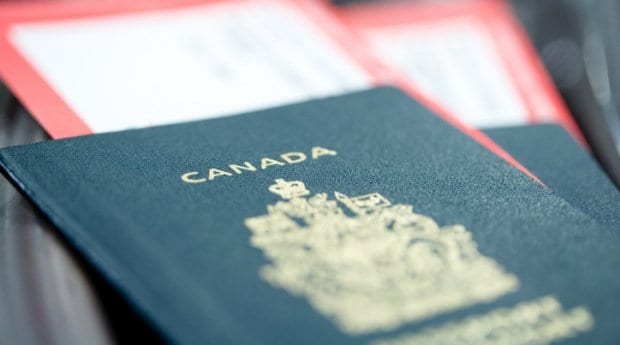While booking a flight for a recent trip to Halifax, RJ Vandrish was faced with a stressful choice that many other trans people encounter — choosing a gender on the airline booking form.
Vandrish, who uses the pronoun they, identifies as genderqueer, an option that does not exist on passports or other government-issued identification in Canada.
While Vandrish has been misgendered by everyone from liquor-store cashiers checking identification to employees at an airline check-in counter, travel poses a more difficult issue. Transport Canada regulations state that airlines cannot carry someone who doesn’t look like the gender that is stated on their identification — a challenge for Vandrish, who fears what might happen if an airline employee or security person decides that Vandrish doesn’t fit the gender they are forced to have on their passport.
“Unless I get insurance, I’m not going to get a refund,” they say. “I don’t know who is going to be looking at me.” Writing in Xtra in 2014, Vandrish recalled a trip where they ended up deciding to present as female and travel with their Ontario driver’s licence, which they were able to have changed.
Having one’s gender changed on government-issued Ontario identification requires getting a letter from a doctor or psychiatrist that confirms that sex reassignment has taken place or that one identifies as a gender other than what is listed on one’s birth certificate. And there is no option for people who don’t identify with either the male or female box.
“I have never been able to change my birth certificate; I have never been able to change my passport,” Christin Milloy told Xtra in early January. A prominent trans activist and writer who has freelanced for Xtra, Milloy refuses to show the government a doctor’s letter confirming her trans identity, a requirement that she believes is discriminatory.
In all but three provinces, changing one’s gender on official identification requires getting a letter from a doctor confirming that the applicant has had sex-reassignment surgery (SRS).
Ontario legislators amended the Vital Statistics Act in 2012 so that trans people, while still needing a letter from either a doctor or a psychiatrist, no longer need to have had SRS. Alberta and British Columbia have made similar amendments.
In 2014, Manitoba legislators changed their Vital Statistics Act so that SRS was not required. The Manitoba Vital Statistics Agency website says that preparations for implementation of the new amendments are underway and that the public will be updated in early 2015.
While these measures make it easier to get accurate identification, complications still arise.
The key document that needs to be changed is the birth certificate — all other identifications flow from this, including the Canadian passport, Milloy says.
Alex B, who declined to give his last name, lives in Ontario but was born in New Brunswick. Because New Brunswick requires proof of SRS, he would have to have surgery here in Toronto, get a doctor’s letter, then fly home to submit his documentation.
Comparatively, getting his name changed was a piece of cake. “The name was, like, $140 and some long paperwork,” he says.
Milloy, with the support of several other trans community members, has started a campaign aimed at improving access to change the gender designation on Ontario identification — Fix Trans ID. She wants the process for changing one’s gender on official documents in Ontario to be similar to the much simpler process for changing one’s name.
A name change requires only that a guarantor fill out a form confirming that the person requesting the name change has lived in Ontario for 12 months. The list of potential guarantors is much longer than the list of those who can confirm a trans person’s gender identity: Ontario lawyers, school principals and managers and signing officers at banks are all acceptable.
The Fix Trans ID campaign is also advocating for a third option, X, to be added for people who don’t identify as male or female.
In May 2012, Passport Canada reviewed whether it would use the X designation on passports. A spokesperson told Vandrish last year that the office subsequently decided to maintain the current policy, citing international aviation guidelines that say gender must be displayed on passports.
However, the International Civil Aviation Organization says that X can be used in place of male or female. Australia, New Zealand and Germany already allow X to be used in place of male or female on passports. Germany also allows parents to leave the gender field blank on birth certificates.
At the heart of the identification debate is who gets to define gender: doctors or their patients.
“If nobody else in Ontario has to show a doctor’s note to prove their gender, then why should a trans person have to?” Milloy asks.
Both the Canadian Medical Association and the Canadian Psychological Association say that people have the right to define their own gender identities.
The Ontario Human Rights Commission (OHRC) has long taken the same stance. In 2012, the OHRC wrote that the Ontario Human Rights Tribunal decision XY v Ontario found it was discriminatory to require SRS and affirmed its stance on the issue.
According to lawyer Nicole Nussbaum, a Legal Aid Ontario lawyer who is working with the HIV & AIDS Legal Clinic Ontario on the Trans Legal Needs Assessment Project, it is clear from case law and OHRC policy that a person’s lived identity is entitled to respect. “The OHRC understands ‘lived gender identity’ to apply to people with non-binary gender identities and that allowing for an X designation on birth certificates and other identity documents would allow for appropriate recognition,” she writes in an email.
Glen Murray, Ontario’s minister of the environment and climate change, has also provided support to the Fix Trans ID campaign. Though out of Canada when Xtra contacted him, Murray said in a text message that he is a supporter of the work the trans community is doing around this issue.
Milloy is hopeful that the campaign, which already has more than 100 signatures, will catch the attention of David Orazietti, minister of government and consumer services.
Orazietti was not available for comment, but his spokesperson, Andrew Donnachie, sent Xtra a statement saying that they are always willing to listen to the concerns of individuals and will give any suggestion “proper consideration moving forward.”
Vandrish is now taking their fight to the Canadian Human Rights Commission. On Jan 6, they filed a formal complaint on the grounds that Passport Canada’s policy of not providing gender-non-specific passports is discriminatory to transgender people. Vandrish is not alone in approaching the courts. In Newfoundland, Kyra Rees has challenged the government to change its requirement that people need to show proof of SRS to change their gender on their identification.
“It says we have a place for you,” Vandrish says of gender-non-specific identification. “And you don’t have to lie about who you are.”
HG Watson can be reached at hg.watson@dailyxtra.com or @hg_watson on Twitter.


 Why you can trust Xtra
Why you can trust Xtra


